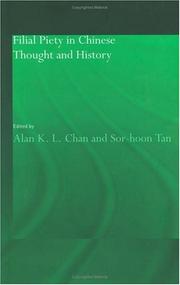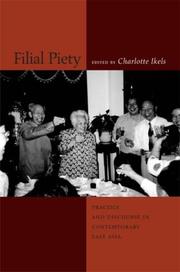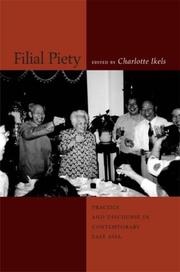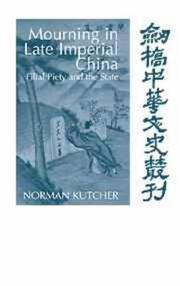| Listing 1 - 10 of 10 |
Sort by
|
Book
ISBN: 1684176069 0674241177 Year: 2019 Publisher: Cambridge, Massachusetts ; London, England : Harvard University Asia Center,
Abstract | Keywords | Export | Availability | Bookmark
 Loading...
Loading...Choose an application
- Reference Manager
- EndNote
- RefWorks (Direct export to RefWorks)
"Analyzes filial narratives from a wide range of primary texts from late Imperial China, including local gazetteers, biographical records, and fiction, to identify filial piety as the dominant expression of love in Qing texts and show the diversity of acts that constituted exemplary filial piety"--Provided by publisher.
Filial piety --- Filial piety in literature. --- Chinese literature. --- Filial love --- Piety, Filial --- Conduct of life --- Parent and child --- Piety --- History. --- Chinese literature --- China --- History
Book
ISBN: 9788810505281 881050528X Year: 2008 Publisher: Bologna EDB
Abstract | Keywords | Export | Availability | Bookmark
 Loading...
Loading...Choose an application
- Reference Manager
- EndNote
- RefWorks (Direct export to RefWorks)
Christian ethics --- Filial piety --- 241 --- Filial love --- Piety, Filial --- Conduct of life --- Parent and child --- Piety --- Ethical theology --- Moral theology --- Theology, Ethical --- Theology, Moral --- Christian life --- Christian philosophy --- Religious ethics --- Moraaltheologie. Theologische ethiek
Book
ISBN: 1108974473 1108976085 1108968945 1108838359 Year: 2022 Publisher: Cambridge : Cambridge University Press,
Abstract | Keywords | Export | Availability | Bookmark
 Loading...
Loading...Choose an application
- Reference Manager
- EndNote
- RefWorks (Direct export to RefWorks)
In Imperial China, the idea of filial piety not only shaped family relations but was also the official ideology by which Qing China was governed. In State and Family in China, Yue Du examines the relationship between politics and intergenerational family relations in China from the Qing period to 1949, focusing on changes in family law, parent-child relationships, and the changing nature of the Chinese state during this period. This book highlights how the Qing dynasty treated the state-sponsored parent-child hierarchy as the axis around which Chinese family and political power relations were constructed and maintained. It shows how following the fall of the Qing in 1911, reform of filial piety law in the Republic of China became the basis of state-directed family reform, playing a central role in China's transition from empire to nation-state.
Families --- Family policy --- Filial piety --- History. --- Filial love --- Piety, Filial --- Conduct of life --- Parent and child --- Piety --- Families and state --- State and families --- Public welfare --- Social security --- Social policy --- Government policy --- History

ISBN: 0415333652 Year: 2004 Publisher: New York (N.Y.): RoutledgeCurzon
Abstract | Keywords | Export | Availability | Bookmark
 Loading...
Loading...Choose an application
- Reference Manager
- EndNote
- RefWorks (Direct export to RefWorks)
S12/0375 --- S12/0370 --- Filial piety --- -Conduct of life --- Ethics, Practical --- Morals --- Personal conduct --- Ethics --- Philosophical counseling --- Filial love --- Piety, Filial --- Conduct of life --- Parent and child --- Piety --- China: Philosophy and Classics--Filial piety --- China: Philosophy and Classics--Xiaojing 孝經 --- Conduct of life.
Book
ISBN: 9781108974479 9781108838351 9781108978811 1108976085 1108974473 Year: 2022 Publisher: Cambridge Cambridge University Press
Abstract | Keywords | Export | Availability | Bookmark
 Loading...
Loading...Choose an application
- Reference Manager
- EndNote
- RefWorks (Direct export to RefWorks)
In Imperial China, the idea of filial piety not only shaped family relations but was also the official ideology by which Qing China was governed. In State and Family in China, Yue Du examines the relationship between politics and intergenerational family relations in China from the Qing period to 1949, focusing on changes in family law, parent-child relationships, and the changing nature of the Chinese state during this period. This book highlights how the Qing dynasty treated the state-sponsored parent-child hierarchy as the axis around which Chinese family and political power relations were constructed and maintained. It shows how following the fall of the Qing in 1911, reform of filial piety law in the Republic of China became the basis of state-directed family reform, playing a central role in China's transition from empire to nation-state.
Families --- Family policy --- Filial piety --- Filial love --- Piety, Filial --- Conduct of life --- Parent and child --- Piety --- Families and state --- State and families --- Public welfare --- Social security --- Social policy --- History --- Government policy --- S06/0205 --- S11/0700 --- S12/0375 --- China: Politics and government--Government and political institutions: Qing --- China: Social sciences--Clan and family: general and before 1949 (incl. names, clan rules) --- China: Philosophy and Classics--Filial piety --- E-books
Book
ISBN: 8988095839 9788988095836 Year: 2005 Publisher: Paju Jimoondang
Abstract | Keywords | Export | Availability | Bookmark
 Loading...
Loading...Choose an application
- Reference Manager
- EndNote
- RefWorks (Direct export to RefWorks)
Filial piety --- Older people --- Aging parents --- Family relationships --- Care --- K9322.80 --- K9325.30 --- Korea: Communities, social classes and groups -- elderly --- Korea: Communities, social classes and groups -- family -- generation and age relations --- Aged --- Aging people --- Elderly people --- Old people --- Older adults --- Older persons --- Senior citizens --- Seniors (Older people) --- Age groups --- Persons --- Gerontocracy --- Gerontology --- Old age --- Filial love --- Piety, Filial --- Conduct of life --- Parent and child --- Piety --- Elderly parents --- Parents, Aged --- Parents --- Sandwich generation --- Filial piety - Korea (South) --- Older people - Family relationships - Korea (South) --- Aging parents - Care - Korea (South) --- Older people - Family relationships - East Asia --- Older people - Family relationships - Cross-cultural studies

ISBN: 0804767165 1417519444 9781417519446 9780804767163 0804747903 0804747911 9780804747905 9780804747912 Year: 2004 Publisher: Stanford, Calif. Stanford University Press
Abstract | Keywords | Export | Availability | Bookmark
 Loading...
Loading...Choose an application
- Reference Manager
- EndNote
- RefWorks (Direct export to RefWorks)
How have rapid industrial development and the aging of the population affected the expression of filial piety in East Asia? Eleven experienced fieldworkers take a fresh look at an old idea, analyzing contemporary behavior, not norms, among both rural and urban families in China, Japan, Korea, and Taiwan. Each chapter presents rich ethnographic data on how filial piety shapes the decisions and daily lives of adult children and their elderly parents. The authors’ ability to speak the local languages and their long-term, direct contact with the villagers and city dwellers they studied lend an immediacy and authenticity lacking in more abstract treatments of the topic. This book is an ideal text for social science and humanities courses on East Asia because it focuses on shared cultural practices while analyzing the ways these practices vary with local circumstances of history, economics, social organization, and demography and with personal circumstances of income, gender, and family configuration.
Kinship --- Families --- Households --- Parent and adult child --- Filial piety --- Adult children of aging parents --- Aging parents --- Aging parents' adult children --- Children of aging parents --- Sandwich generation --- Filial love --- Piety, Filial --- Conduct of life --- Parent and child --- Piety --- Adult child and parent --- Adult children and parents --- Parent-adult child relations --- Parents and adult children --- Adult children living with parents --- Population --- Home economics --- Family --- Family life --- Family relationships --- Family structure --- Relationships, Family --- Structure, Family --- Social institutions --- Birth order --- Domestic relations --- Home --- Marriage --- Matriarchy --- Parenthood --- Patriarchy --- Ethnology --- Clans --- Consanguinity --- Kin recognition --- Care --- Social aspects --- Social conditions --- East Asia --- Asia, East --- Asia, Eastern --- East (Far East) --- Eastern Asia --- Far East --- Orient --- Social life and customs.

ISBN: 3161476808 9783161476808 Year: 2002 Volume: 146 Publisher: Tübingen Mohr Siebeck
Abstract | Keywords | Export | Availability | Bookmark
 Loading...
Loading...Choose an application
- Reference Manager
- EndNote
- RefWorks (Direct export to RefWorks)
Filial piety --- Parent and child --- Biblical teaching. --- 241.621 --- 225.08*2 --- -Parent and child --- -Child and parent --- Children and parents --- Parent-child relations --- Parents and children --- Children and adults --- Interpersonal relations --- Parental alienation syndrome --- Sandwich generation --- Filial love --- Piety, Filial --- Conduct of life --- Piety --- Theologische ethiek: relaties binnen het gezin --- Theologie van het Nieuwe Testament: moraal; ethica; juridica Israelis --- Biblical teaching --- Theses --- -Theologische ethiek: relaties binnen het gezin --- 225.08*2 Theologie van het Nieuwe Testament: moraal; ethica; juridica Israelis --- 241.621 Theologische ethiek: relaties binnen het gezin --- -225.08*2 Theologie van het Nieuwe Testament: moraal; ethica; juridica Israelis --- Child and parent --- Ten commandments --- Bible. --- Commandments, Ten --- Decalogue --- Parents. --- Filial piety - Biblical teaching. --- Parent and child - Biblical teaching.

ISBN: 0804747911 0804747903 Year: 2004 Publisher: Stanford (Calif.): Stanford university press
Abstract | Keywords | Export | Availability | Bookmark
 Loading...
Loading...Choose an application
- Reference Manager
- EndNote
- RefWorks (Direct export to RefWorks)
How have rapid industrial development and the aging of the population affected the expression of filial piety in East Asia? Eleven experienced fieldworkers take a fresh look at an old idea, analyzing contemporary behavior, not norms, among both rural and urban families in China, Japan, Korea, and Taiwan. Each chapter presents rich ethnographic data on how filial piety shapes the decisions and daily lives of adult children and their elderly parents. The authors' ability to speak the local languages and their long-term, direct contact with the villagers and city dwellers they studied lend an immediacy and authenticity lacking in more abstract treatments of the topic. This book is an ideal text for social science and humanities courses on East Asia because it focuses on shared cultural practices while analyzing the ways these practices vary with local circumstances of history, economics, social organization, and demography and with personal circumstances of income, gender, and family configuration.
S12/0375 --- S12/0370 --- Kinship --- -Family --- -Households --- Parent and adult child --- -Filial piety --- -Adult children of aging parents --- -Aging parents --- -Elderly parents --- Parents, Aged --- Parents --- Sandwich generation --- Aging parents' adult children --- Children of aging parents --- Aging parents --- Filial love --- Piety, Filial --- Conduct of life --- Parent and child --- Piety --- Adult child and parent --- Adult children and parents --- Parent-adult child relations --- Parents and adult children --- Adult children living with parents --- Population --- Families --- Home economics --- Family --- Family life --- Family relationships --- Family structure --- Relationships, Family --- Structure, Family --- Social institutions --- Birth order --- Domestic relations --- Home --- Households --- Marriage --- Matriarchy --- Parenthood --- Patriarchy --- Ethnology --- Clans --- Consanguinity --- Kin recognition --- China: Philosophy and Classics--Filial piety --- China: Philosophy and Classics--Xiaojing 孝經 --- Care --- -Social aspects --- Social conditions --- East Asia --- -Asia, East --- Asia, Eastern --- East (Far East) --- Eastern Asia --- Far East --- Orient --- Social life and customs --- Adult children of aging parents --- Filial piety --- Social life and customs. --- Social aspects --- Asia, East

ISBN: 0521624398 0521030188 0511572743 Year: 1999 Publisher: Cambridge : Cambridge University Press,
Abstract | Keywords | Export | Availability | Bookmark
 Loading...
Loading...Choose an application
- Reference Manager
- EndNote
- RefWorks (Direct export to RefWorks)
As a conquest dynasty, Qing China's new Manchu leaders desperately needed to legitimize their rule. To win the approval of China's native elites, they developed an ambitious plan to return Confucianism to civil society. Filial piety, the core Confucian value, would once again be upheld by the state, and laborious and time-consuming mourning rituals, the touchstones of a well-ordered Confucian society, would be observed by officials throughout the empire. In this way, the emperor would be following the ancient dictate that he 'govern all-under-heaven with filial piety'. Norman Kutcher's study of mourning looks beneath the rhetoric to demonstrate how the state - unwilling to make the sacrifices that a genuine commitment to proper mourning demanded - quietly but forcefully undermined, not reinvigorated, the Confucian mourning system. With acute sensitivity to language and its changing meanings, Kutcher sheds light on a wide variety of issues that are of interest to historians of late Imperial China.
Mourning customs --- Funeral rites and ceremonies --- Filial piety --- Deuil --- Funérailles --- Piété filiale --- Coutumes --- Rites et cérémonies --- China --- Chine --- Social life and customs --- Moeurs et coutumes --- S13A/0410 --- -Funeral rites and ceremonies --- -Mourning customs --- -Manners and customs --- Rites and ceremonies --- Funerals --- Mortuary ceremonies --- Obsequies --- Manners and customs --- Burial --- Cremation --- Dead --- Filial love --- Piety, Filial --- Conduct of life --- Parent and child --- Piety --- China: Religion--Death, funeral, ancestral worship --- -Filial piety --- -China: Religion--Death, funeral, ancestral worship --- -S13A/0410 --- -Funerals --- Funérailles --- Piété filiale --- Rites et cérémonies --- Cina --- Kinë --- Cathay --- Chinese National Government --- Chung-kuo kuo min cheng fu --- Republic of China (1912-1949) --- Kuo min cheng fu (China : 1912-1949) --- Chung-hua min kuo (1912-1949) --- Kina (China) --- National Government (1912-1949) --- China (Republic : 1912-1949) --- People's Republic of China --- Chinese People's Republic --- Chung-hua jen min kung ho kuo --- Central People's Government of Communist China --- Chung yang jen min cheng fu --- Chung-hua chung yang jen min kung ho kuo --- Central Government of the People's Republic of China --- Zhonghua Renmin Gongheguo --- Zhong hua ren min gong he guo --- Kitaĭskai︠a︡ Narodnai︠a︡ Respublika --- Činská lidová republika --- RRT --- Republik Rakjat Tiongkok --- KNR --- Kytaĭsʹka Narodna Respublika --- Jumhūriyat al-Ṣīn al-Shaʻbīyah --- RRC --- Kitaĭ --- Kínai Népköztársaság --- Chūka Jinmin Kyōwakoku --- Erets Sin --- Sin --- Sāthāranarat Prachāchon Čhīn --- P.R. China --- PR China --- Chung-kuo --- Zhongguo --- Zhonghuaminguo (1912-1949) --- Zhong guo --- République Populaire de Chine --- República Popular China --- Catay --- VR China --- VRChina --- 中國 --- 中国 --- 中华人民共和国 --- Jhongguó --- Bu̇gu̇de Nayiramdaxu Dundadu Arad Ulus --- Bu̇gu̇de Nayiramdaqu Dumdadu Arad Ulus --- Bu̇gd Naĭramdakh Dundad Ard Uls --- Khi︠a︡tad --- Kitad --- Dumdadu Ulus --- Dumdad Uls --- Думдад Улс --- Kitajska --- Arts and Humanities --- History
| Listing 1 - 10 of 10 |
Sort by
|

 Search
Search Feedback
Feedback About UniCat
About UniCat  Help
Help News
News